
Serious comic collectors need serious gear. Like any collectible hobby, there are many companies out there providing that gear, from simple and effective bags and boards all the way up to elaborate storage systems. What do you need? Well, it all depends on a few factors.
- What are you going to do with your comics? Storing them safely requires a different set of gear than trying to clean and press them yourself, shipping them, displaying them, or traveling with them.
- How old are the comics? The older a comic is, the more susceptible to damage it is, and the better it needs to be protected to avoid further degradation.
- How much are you willing to invest? The sky's the limit with expensive and elaborate systems for handling comics, but you can also do just fine with simple, inexpensive gear in most cases.
Let's talk about different purposes and the gear you might need to handle your comics for that purpose.
Table of Contents
Comic Storage and Display Supplies
Most comic book collectors want to buy comics and either store them safely as an investment or display them as a collection. We're lumping those two together because the ways you protect and handle comics for both purposes are basically the same. They're static, protective, and durable above just about anything else.
Bags
Bags are half of the "bag and board" storage system that casual collectors, comic stores, and anyone collecting relatively inexpensive comics will use.
Bags are generally made of mylar or plastic that is free of acid and lignins, which can become acidic and eat away at the paper of a comic over time. Comics that have been bagged and boarded for a long time may benefit from being re-bagged because old bags might not be adequate.
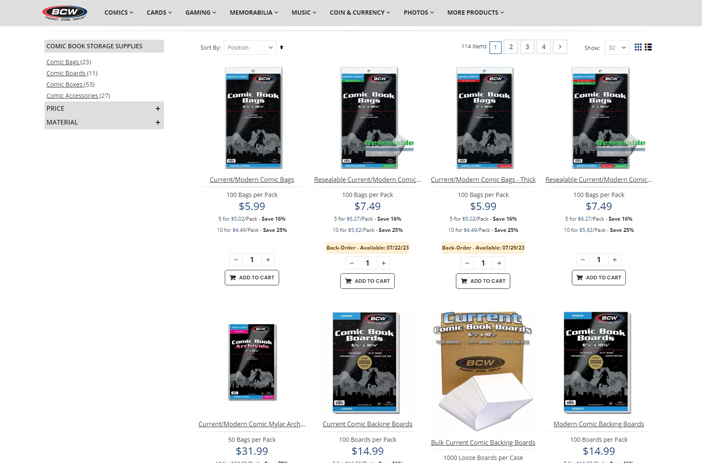
BCW is the gold standard for comic bags and many other supplies. You can find their storefront here, but pretty much every comic shop in the world will have a supply of BCW items available for sale.
Boards
Storing comics in bags is all well and good, but if you store them in a box and they slouch, they can end up with curves, creases, and other damage. Therefore, you need something in the bag with the comic to prevent it from slouching and to keep it stiff while amongst other comics. The solution is a board.
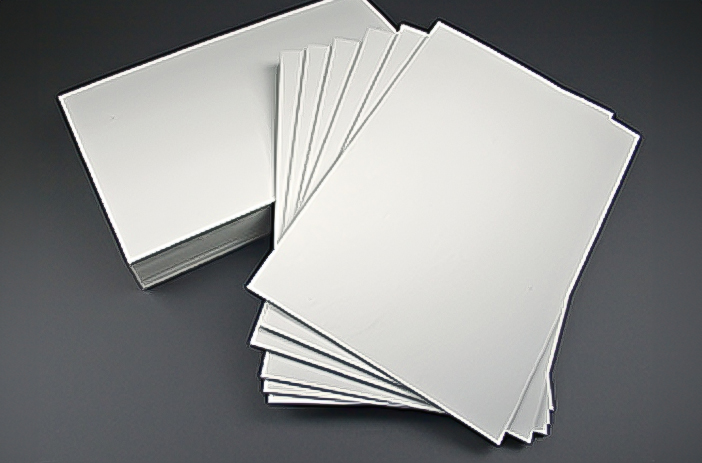
Image source: https://www.oakcreekprintworks.com/comic-book-supplies/comic-backing-boards
A board is, basically, just a thin, stiff slice of cardboard that slots in behind a comic in its bag to provide that support. There are all sorts of different boards, but you generally want one that is both acid-free and acid-absorbing, so it can keep the comic as safe and protected as possible while in its storage bag.
Boxes
Bagged and boarded comics take up a lot of space, so you need something to contain them. You can't just put them in stacks or on a shelf since they're slippery, so they need to be constrained in a box.
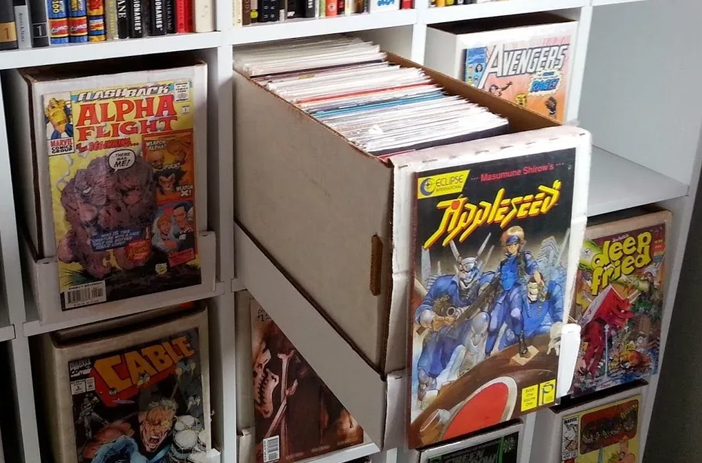
Image source: https://comicbooknews.org/news/f/comic-book-storage-guide
There are a bunch of different styles of boxes, generally all made out of cardboard material sturdy enough to protect them and light enough to be carried.
- Shortboxes. These are short boxes meant to contain about 150 comics bagged and boarded. They fit on bookshelves and are relatively convenient, but they don't have the high capacity necessary for some collectors.
- Longboxes. These are deeper boxes that have essentially the same design as shortboxes but contain more like 200 comics. They can be a bit heavier when full and more difficult to move, but for storage and indexing, they're the gold standard.
- Drawer Boxes. Also called "box houses", these are like short or longboxes in an external container that acts like a drawer housing. This allows you to stack longboxes while still being able to access the lower boxes without moving everything on top.
- Flat boxes. These are boxes meant to contain comics laid flat on top of one another. They can generally only contain 10-20 comics at a time and are best used for short runs and for shipping (but more on shipping later.)
- Flip-top boxes. These are similar to trading card deck boxes but much larger and meant for comics. They can be cool for display but are kind of inconvenient in terms of space required to rifle through them.
Out of everything, unless you have specific needs, the best option is usually just to have a bookshelf or storage rack with shortboxes on it. This gives you the maximum capacity in the most efficient space while minimizing the risk of dropping boxes or otherwise damaging them.
Box Dividers
Unless you have a very good filing system, chances are you'll want dividers to indicate where certain comic lines begin and end inside a box.
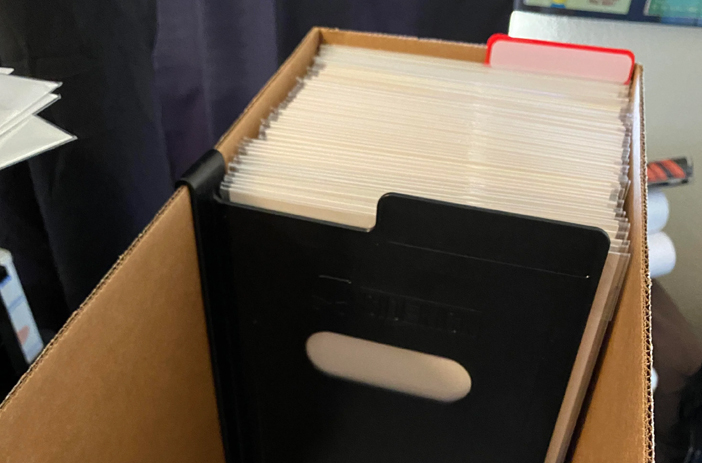
Image source: https://www.reddit.com/r/comicbookcollecting/comments/10phroz/so_i_initially_thought_these_sidekick_comic_box/
Dividers come in a huge array of forms and styles, so just pick the kind you prefer.
Binders and Pages
Some people collect comics in a less compact but more visible manner. When you like flipping through your comics (but not through the books themselves), a binder can be a good option. Binders come in O-ring and D-ring forms; generally, D-ring are the best because they have the least risk of bending a comic at the inner seam.
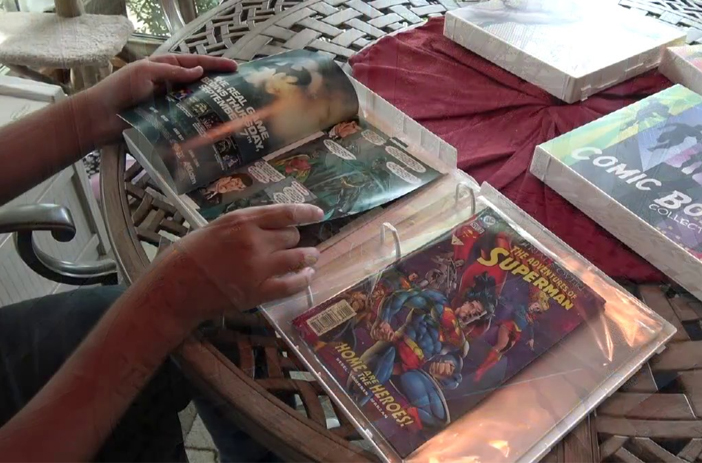
Image source: https://www.pinterest.ph/pin/574068283753803573/
Binder pages are typically top-loading pages meant to hold a bagged-and-boarded comic. They are also made of mylar and are suitable for containing comics over time without degradation.
Folios
Folios are similar to flat boxes, except they open on the side and have a long protective cover to add extra stiffness and protection to the box. They're only meant to hold a dozen or two comics at the most and can be used to hold just a couple of slabbed comics as well.
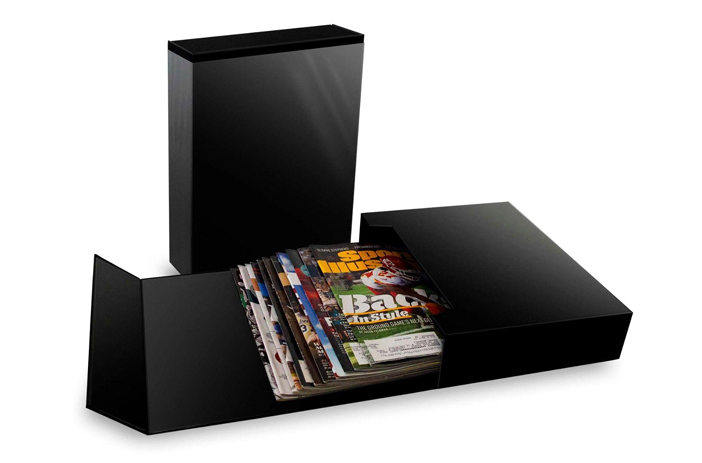
They're good for shelf-storage of small runs and collections but are less effective for larger collections. They can also be good for travel. You can see an example of these kinds of containers here.
Slabs
Slabs are the heavy plastic cases that comics are stored in when you send them out to be graded. This is a service that costs money and can potentially add value to a comic, but it takes time and involves shipping your comics, and it isn't worth it for many low-value comics.
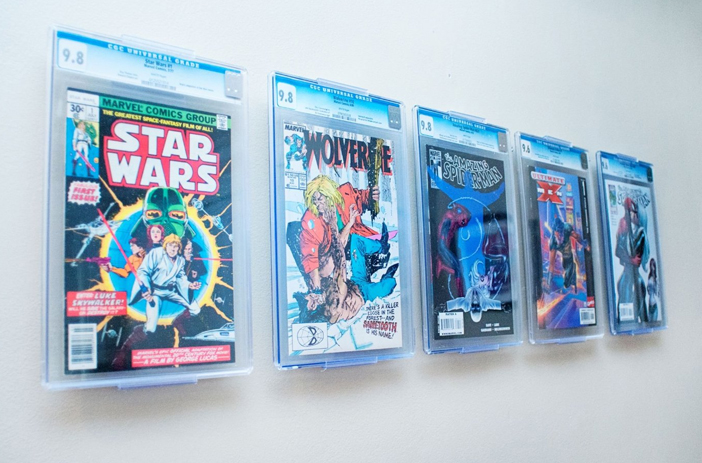
Image source: https://www.thecomicdoctor.com/how-to-effectively-display-slabbed-comic-books/
You can buy DIY slabs as well, such as these from Comic Skin. Usually, though, the question you'll be asked is, "Why?" Slabbing a comic is meant to be added protection for valuable comics, which is best accompanied by grading and authentication. If a comic isn't worth grading, it's often not worth slabbing, either.
That said, slabs look good on display stands, so if you have personal favorites you don't need to grade but still want to be slabbed, you can slab them yourself.
Comic Cleaning Supplies
Comics are generally graded in as-is condition, and the damage they accrue over time will affect that grade. The better the condition of a comic, the more valuable it is. That said, some forms of damage, like dust, dirt, small markings, minor folds and creases, and other such issues, can be fixed through cleaning and pressing.
Before we get into the supplies you might use to clean and press your own comics, know this: it's very risky to do without training. You can easily damage comics, particularly older and more fragile comics, and that can do more harm than good. If you have valuable comics you want to be cleaned, send them to a company like CGC to have them cleaned and pressed. If you want to clean and press your own comics, though, here are the supplies you might want to get.
- Erasers. Soft PVC and harder rubber erasers can remove dirt and pencil marks and can help remove grime from lighter-colored areas on pages. They can also damage paper and remove ink, though, so be careful using them.
- Absorene pads. These are a brand of eraser pads that are easy to use and soft on comics and are generally considered a must-have for cleaning. Absorene also comes in putty form for more free-form usage.
- Dental tools. Small picks can be useful for picking out embedded dirt and grime without scraping away too much of a comic's paper or ink in the process. A steady hand is a must.
- Makeup remover pads. These pads are soft and not very abrasive, making them great tools for removing dust and dirt from the pages of comics. Note: make sure the pads you get do not have any additives or lotions, which will do immense damage to a comic.
Some people recommend certain tools to whiten the darkening or yellowing pages of comics. Things like blue light or hydrogen peroxide can do this, but they can also damage existing ink or degrade the quality of the paper, and if you use them wrong, it can be immensely damaging. Be extremely cautious if you want to do this, and practice extensively on comics you don't care about first.
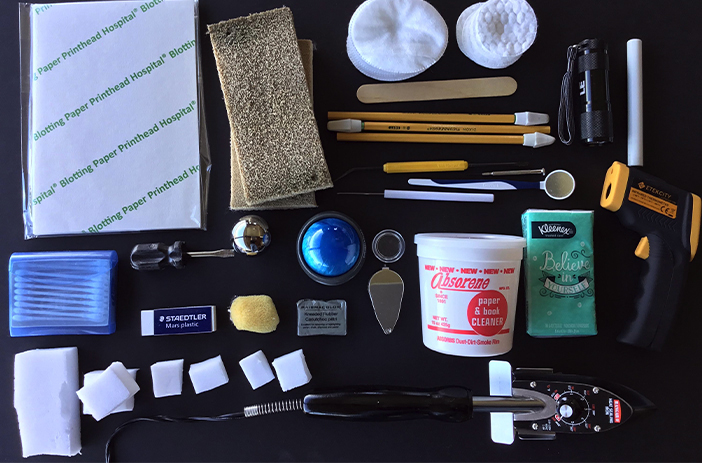
As for pressing, there are two things you need: a humidity chamber and a pressing system.
A humidity chamber can be made at home out of tubs, racks, and distilled water. Water can easily destroy a comic, though, so be very careful here as well. There are many guides like this one available. Be cautious, though; some people create guides like "how to press comics with an iron" that are much more likely to just destroy a book instead.
Pressing, meanwhile, simply requires cardstock to separate pages, large, flat panels to support the comic, and weights to press it down. The above guide, as well as this rundown, can help you get started.
Comic Travel Supplies
If you travel with comics, like to and from conventions, you need a way to secure them while driving or flying. Some options, like flat boxes, folios, or secure longboxes, can be perfectly fine.
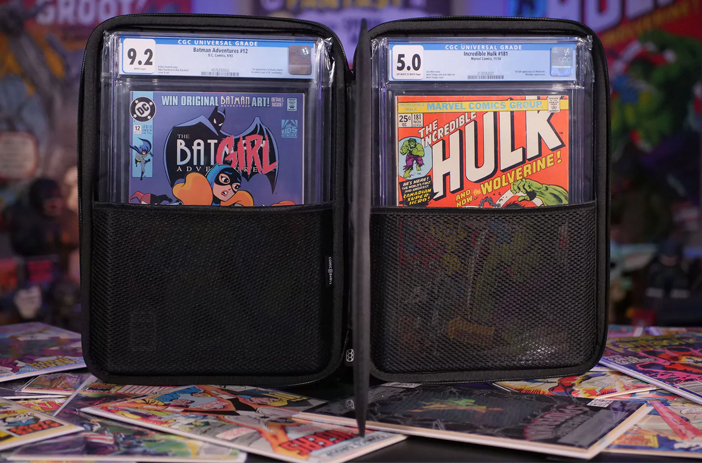
You may also want additional accessories such as:
- Locking boxes for safety and protection from casual theft.
- Sturdy plastic folios and boxes for storing other boxes and protecting them from moisture, spills, or impacts.
- Hard-shelled suitcases for shipping comics on flights.
- Protective containers for slabbed comics (like Comic Shells) can protect slabs from cracking while traveling.
One thing to note is that comics can show up oddly on TSA inspections, so you may be asked to open and unpack a container to demonstrate what's inside. They aren't prohibited, but they can cause problems in some cases.
Comic Shipping Supplies
Shipping comics is common, especially if you're buying and selling them frequently on auctions or from vendors online. There are a variety of supplies you can get here as well, though many of them are simply variations on storage supplies that you pack solidly in cardboard boxes with protection as you ship them.
- Mailers are like flat boxes that can store up to 10 comics securely for shipping and are disposable, so they can be taped shut without damaging the comics within.
- Gemini mailers are a specific kind of mailer meant for just a couple of comics, which hold them securely and wrap around them tightly to protect them with a minimum of excess space.
- Divider pads help insulate comics from rubbing against one another, which can cause abrasions and scratches in bags and slabs, reducing their display value.
- Bubble wrap can come in sheets perfectly sized for comics and comic boxes for further padding.
When shipping comics, especially high-value comics, don't forget to pay the extra amount for insurance and shipping confirmation. Nothing is worse than having a comic arrive damaged, be stolen, or never arrive at all. The peace of mind is cheap.
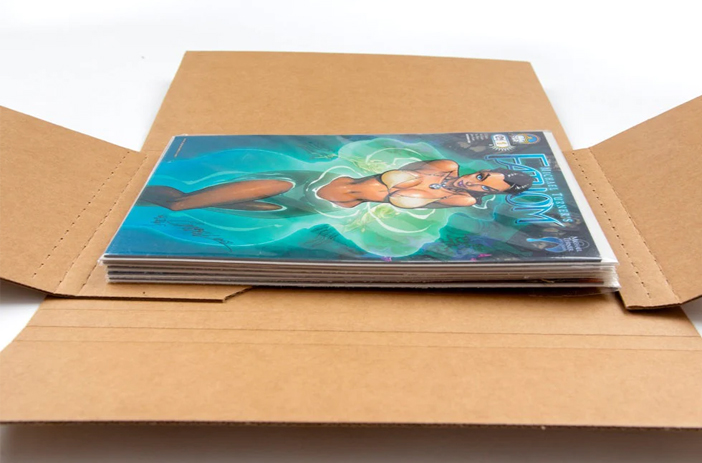
If you want a good idea of how comics can be shipped appropriately, why not buy some from us? As the #1 vintage comic store in America, we're constantly shipping high-value comics, and we're proud to say we virtually never have issues shipping them. Then, once you've seen it in action, you can pack up your comics to sell to us the same way. We can't wait to hear from you!

 Brent Moeshlin
Brent Moeshlin


